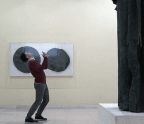
Joanna Hogg chases authenticity. Her reluctance to call “Cut,” instead letting a scene’s action carry on via languid takes, static camerawork, and unscripted dialogue, reflects her intuitive sense of how small but telling slips within the typically dull cadences of British upper-middle-class social chatter can reveal roiling undercurrents of feeling. Yet while her debut feature, Unrelated (2007), convincingly sold this illusion of casualness, the visual and narrative rigour that underlies it came to the fore as early as her follow-up, Archipelago (2010). At one point in the latter, members of a family taking an off-season vacation are grouped against the severe blankness of a blue-gray wall, where an almost imperceptible differentiation in colour draws our eyes to a phantom square. The characters, who have holidayed in this house frequently over the years, confirm in dialogue that an artwork once hung there, but the image was so “horrible” that they asked to have it removed rather than have to endure it for their stay. At the end of the film, the painting is rehung, revealing this vision of horror: a tempestuous seascape, a seemingly innocuous image that becomes charged within this family’s barely concealed triangulation of resentment.
Hogg’s early films derive much of their tension from this interplay between presence and absence, or between anticipated realization and ultimate irresolution: conflict curves toward moments of explosion only to recede from them as characters tenuously maintain the codes of behaviour that govern their class milieu. The acute precision with which Hogg renders these scenarios of barely sustained repression and things left almost-said makes it all the more surprising to encounter the unrestrained stylistic excess of her very first work. (1986) is an -style satire of fashion-magazine ideals which drops Tilda Swinton into a fantasy world constructed from candy-coloured mattes that evoke Powell and Pressburger and Hollywood musicals. After graduating from NFTS, Hogg spent nearly two decades working in advertising, music videos, and television, including episodes of soaps like , , and Going independent at the age of 47, she wrote and directed , which won the FIPRESCI prize at the London Film Festival and went on to steadily accrue admirers as it bopped around minor festivals in the UK and the US.






